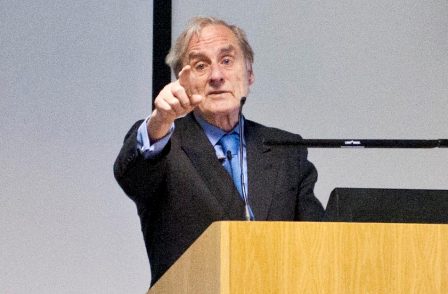
Lydia Wilkins was an 18-year-old journalism student in 2017 when she was first introduced to the name ‘Harold Evans’ in a lecture on contempt of court.
She was fascinated by the story of the Thalidomide children, who Evans helped to secure compensation in a landmark case. She ended up visiting the company formerly known as Chemie Grunenthal, the organisation at the heart of the story, less than a year after her graduation. Over email, the former Times and Northern Echo editor would advise her (who he quickly dubbed ‘Sherlock’) on what to look out for, the details and questions to capture.
Evans became a mentor and friend to Wilkins, and in February 2018, she conducted one of the last interviews he would give (when he was then aged 89).
Having watched 2014 documentary Attacking The Devil: Harold Evans And The Last Nazi War Crime, Wilkins asked Evans what ‘devil’ had been the most worthwhile to pursue as a journalist. What follows is an edited extract from the interview…
Evans said “restrictive laws like the contempt (Of Court Act), which probably prevented many ill things being ventilated for the public benefit” have been his biggest foe as they lead to the suppression of truth. When we met in a club in London, he admonished at length “greedy business people, like Distillers, interestingly an all-male board, deciding the fate of mothers and their children.”
Distillers was a liquor company which diversified into pharmaceuticals. It sold Thalidomide under the name Distaval in 1959-61, as licensed by the company then known as Chemie Grunenthal. Distaval was prescribed for morning sickness, but was not safe to use during pregnancy. It attacked the foetus; it would destroy the formation of arms, legs or hands. It would also damage organs, hearing, or sight.
The British government at the time refused to hold a public inquiry, leaving the parents of survivors to sue Distillers, who denied negligence. The Contempt Of Court Act acted as a ban on public discussion of the scandal in the press until the legal claim had been heard, meaning the families were left struggling in silence into the 1970s.
Reflecting on the impact, Evans said that it “stirs the same kind of anger in me as all the Republican senators meeting without a single woman present to discuss women’s health”. Before the overturning of Roe versus Wade, the Trump administration had reconvened at the White House for such a discussion – with no woman present, which did not go unnoticed.
With budgets ever tightening for investigative projects, Evans was keen to stress “there is some very good investigative journalism going on.”, but added “it’s amazing to me how limited it is in its range”. An American citizen, Evans was a fierce critic of the National Rifle Association and an advocate for gun control, verbally plotting what he would do as a campaigning editor: “I would pinpoint those Republicans who are holding up gun control, and what their connections are.”
Advocating for diversity in journalism, he also noted the advantages that this could bring to investigative reporting. Admitting there were too few women under his editorship at The Sunday Times, he said he caused “displeasure by creating the first woman photo editor, because it was thought to be a male occupation. So, clearly today is nothing like as restrictive.”
Evans was most responsive when talking about how people on the Autistic spectrum can be an asset to journalism, noting there “is a whole spectrum there between people with highly specialised skills and certain social inabilities which can be overcome”.
I’m also curious as to what Evans’ advice for journalists today would be. His response reflects his views, seemingly, towards the Leveson Inquiry, and the lack of ethics it revealed.
“Well, realise what journalism ought to be. So, you haven’t succeeded in journalism if you’ve got a scoop by cheap and nasty means, or made somebody’s life miserable without cause. I mean, look at half the tabloid gossip columnists. That’s not journalism, that’s scavenging.
“So, for journalists today, I would say first of all identify what journalism is for you, what are the objects of journalism. And the simple answer is the truth, but it’s very hard to define. Matthew Arnold was good on this: ‘Truth does not lie in the middle.’ On the one hand, Hitler was a maniac, on the other hand Germany needed a strong leader…”
“So I think, as a journalist, respect the dignity, freedom in intelligence, of people you’re going to be reporting on. And don’t make things up.”
My final question is: given his impressive achievements, how would he like to be remembered?
He clanks his teacup in his haste to answer: “What about I’m alive today?”
Gently admonished, there’s laughter in his response, and a wish to “not go upstairs” for the next thousand years. Yet, cut through the laughter, and there’s a meek quality. He answers seriously:
“I’d like to be remembered as Harry. The son of Frederick, the husband of Enid and Tina. The father of Georgie, Izzy, Ruth, Mike, and Kate.”
To read more of this interview, visit Lydia’s Substack newsletter here.
Email pged@pressgazette.co.uk to point out mistakes, provide story tips or send in a letter for publication on our "Letters Page" blog
